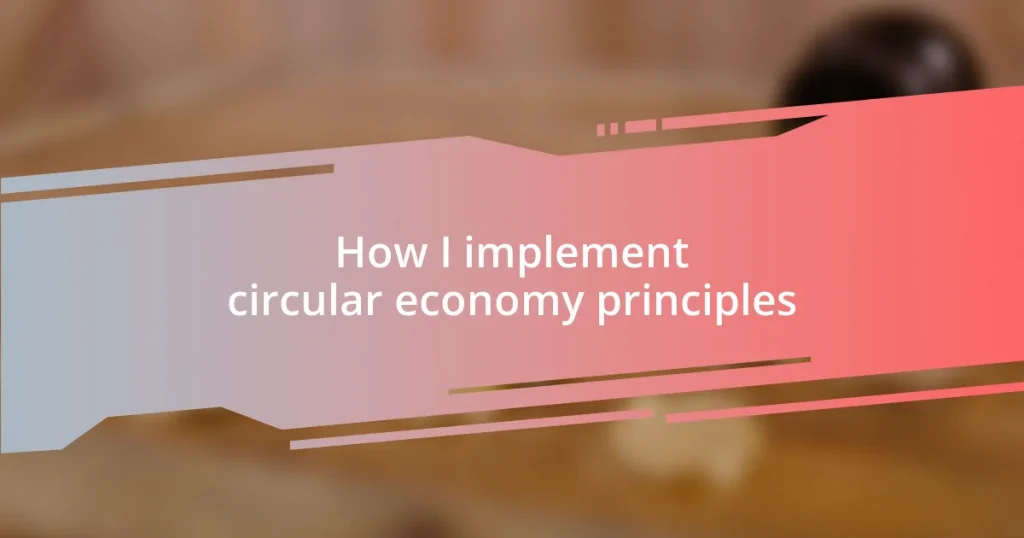Key takeaways:
- EU regulations, such as sustainability and data protection, can drive innovation and enhance business practices rather than merely imposing compliance burdens.
- Proactive strategies, including ongoing education and the use of technology, significantly improve compliance processes and organizational adaptability.
- Future trends indicate a growing emphasis on sustainability, digital transformation, and corporate transparency, reshaping how businesses operate and engage with consumers.

Understanding EU Regulations Impact
Understanding the impact of EU regulations is like navigating a complex maze—each turn reveals new challenges and opportunities. I remember when the GDPR was introduced; it felt overwhelming at first. Yet, once I dug deeper, I realized that these regulations could actually provide a framework for better data protection, fostering trust with customers. Have you ever considered how such regulations could shape business practices?
As I observe various industries adapting to these changes, it’s clear that compliance isn’t merely a box-ticking exercise; it’s a chance to innovate and improve. For instance, companies are increasingly investing in sustainable practices not just to meet regulations but to resonate with environmentally conscious consumers. Isn’t it fascinating how regulations can drive positive societal change while benefiting businesses too?
When I speak to business owners, I often hear a mix of frustration and acceptance regarding these laws. They can feel burdensome, but I’ve learned that understanding the spirit behind these regulations can make a world of difference. By viewing them as a roadmap rather than an obstacle, companies can align their values with regulatory compliance, ultimately enhancing their reputation and customer loyalty. What has been your experience with navigating these regulatory waters?

Key Areas of Regulation Change
One key area of regulation change is the focus on environmental sustainability. I recall a conversation I had with a colleague who runs a manufacturing business. He was initially resistant to the idea of implementing new sustainable practices due to the perceived costs. But as we discussed the evolving regulations and consumer expectations, he began to see it as more of a necessity rather than a chore. This shift in mindset can truly open doors for innovation and brand loyalty.
- Sustainable Practices: Stricter regulations on emissions and waste management.
- Data Protection: Enhanced requirements for data privacy and consumer rights.
- Digital Transformation: Guidelines surrounding AI usage and digital services.
- Consumer Protection: New mandates aimed at improving product safety and transparency.
In my experience, compliance can lead to unexpected benefits. For example, a small startup I consulted for re-evaluated its supply chain in response to impending regulations and found cost savings in the process. Realizing that regulation can be an opportunity rather than a hurdle is vital for modern businesses.

Challenges Facing Businesses Today
The rapid evolution of technology places a significant burden on businesses, forcing them to keep pace or risk falling behind. I’ve witnessed this firsthand with a friend who runs a tech startup. His team scrambled to adapt to new compliance measures while simultaneously pushing out product updates. The stress of doing both often felt like trying to juggle flaming torches. It’s a challenge many face today; how can businesses innovate while ensuring they meet regulatory demands?
Financial constraints are also a pressing issue. A few months back, I had coffee with a former colleague who runs a small retail operation. She expressed her frustration about the unexpected costs incurred from adjusting to new regulations. It hit me how daunting it can be for smaller companies to allocate resources for compliance when margins are already tight. Have you found that your budget feels stretched too thin as you navigate these complexities?
Lastly, the continuous shift in consumer expectations complicates matters even further. I was part of a focus group recently where we discussed how transparency has become a non-negotiable for buyers. Many businesses today face the challenge of balancing the need for compliance with evolving consumer values. This evolving landscape demands agility and foresight.
| Challenges | Personal Insight |
|---|---|
| Technological Adaptation | Balancing compliance with innovation can feel overwhelming, much like juggling flaming torches. |
| Financial Constraints | Unexpected costs for compliance can stretch budgets, particularly for small businesses. |
| Consumer Expectations | Meeting the demand for transparency requires agility amidst shifting regulations. |

Compliance Strategies for Companies
I’ve seen how crucial it is for companies to adopt a proactive compliance strategy, especially in the face of changing regulations. For instance, a friend who operates a logistics firm invested time in staff training to better understand data protection laws. It not only cushioned the company against potential fines but also fostered a culture of responsibility. Have you considered how ongoing education within your team can transform compliance from a checkbox to a genuine value?
Another effective strategy lies in the use of technology to streamline compliance processes. I was once involved with a company that implemented a compliance management software, and the results were astounding. They were able to automate reporting and keep track of regulatory updates seamlessly. As someone who has witnessed the relief on team members’ faces when tedious tasks become less overwhelming, I can’t stress enough how technology can enhance efficiency and reduce anxiety around compliance.
Lastly, collaboration with industry peers can provide invaluable insights. I remember attending a workshop where businesses shared their approaches to consumer protection requirements. Hearing their experiences not only brought new ideas to light but also reassured me that we’re all in this together. How often do you reach out to others in your industry for support? Finding common ground can help demystify complex regulations and create a community approach to compliance.

Potential Benefits of New Regulations
While new EU regulations may initially seem burdensome, they can actually serve as a catalyst for innovation. I recall an instance where a colleague revamped her product line in response to stricter environmental guidelines. Not only did this elevate her brand’s reputation, but it also opened up new market opportunities focused on sustainability. Isn’t it interesting how what might appear as a restriction can sometimes lead to creative breakthroughs and a broader customer base?
Another potential benefit lies in the harmonization of standards across the EU. I often think back to a time when navigating regulatory landscapes felt like piecing together a jigsaw puzzle with missing pieces. Knowing that businesses will soon have a common set of rules can simplify operations tremendously. It gives companies a clearer path, reducing the frustration of dealing with multiple, often conflicting, local regulations. How much easier would it be to focus on growth rather than constantly second-guessing compliance?
Lastly, these new regulations can enhance consumer trust and loyalty. I’ve personally noticed a shift in the way I approach brands after they demonstrate a commitment to transparency and ethical practices. For instance, I gravitate more toward companies that openly share their compliance measures, especially concerning data protection. It’s heartening to see regulations encouraging businesses to prioritize ethical behavior. Doesn’t it feel reassuring to support a company that values its customers enough to meet—and exceed—regulatory expectations?

Future Trends in EU Regulation
I anticipate that EU regulations will increasingly lean towards sustainability and environmental impact. During a recent webinar, experts emphasized how regulatory frameworks are evolving to prioritize green practices. It’s fascinating to think about how companies might find themselves not just complying but actually thriving by adopting eco-friendly approaches. Have you ever considered how such shifts could reshape entire business models?
Digital transformation is another trend that I believe will gain momentum within EU regulations. With the push toward a digital economy, businesses will need to adapt to new compliance measures related to technology and data use. I remember a project where we struggled to align our data practices with the existing guidelines, and it was a challenge that required both flexibility and innovation. Could your team be embracing the latest tech trends to simplify compliance rather than resist change?
Lastly, I see a growing emphasis on accountability and transparency in corporate governance. Reflecting on my experiences, I once collaborated with a startup that faced scrutiny for its lack of transparency. It was a game-changer when they decided to be open about their processes and compliance efforts. In today’s landscape, how effectively does your organization communicate its values and practices? Genuine transparency can create stronger connections with customers and foster a culture of trust, which I’ve found to be invaluable in the long run.

Your Role in Regulatory Adaptation
Your role in regulatory adaptation is crucial in navigating this evolving landscape. I remember a time when I led a team through significant changes in compliance regulations. It felt daunting, but I encouraged my team to view this as an opportunity for growth rather than an obstacle. By fostering a positive mindset, we found innovative solutions that not only met the new standards but also enhanced our workflows. How do you think your work environment could change if everyone embraced this perspective?
Moreover, staying informed is vital. One of the best strategies I’ve adopted is actively participating in industry forums and discussions. I’ve learned firsthand how sharing insights with peers can illuminate the path forward. When I attended a recent conference, I was amazed by the knowledge exchange and the collaborative energy present. Have you engaged with your professional community in a way that fuels your understanding of upcoming regulations?
Lastly, I believe that taking a proactive approach truly sets the stage for success. In my past roles, I initiated regular training sessions to prepare my colleagues for shifts in regulations before they occurred. This information-sharing not only equipped everyone to handle the changes with confidence but also cultivated a culture of adaptability. What steps can you take today to ensure that your team remains agile and ready for what’s to come?














